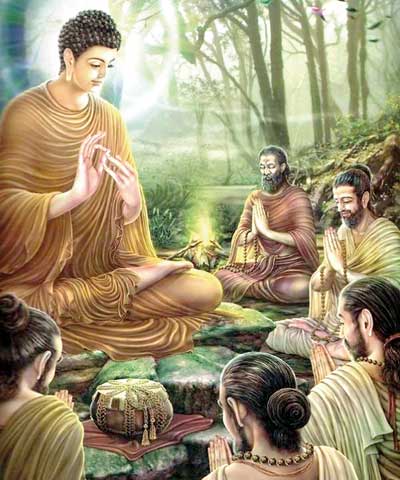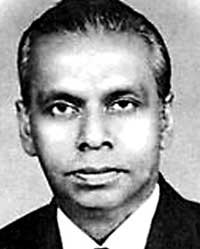Reply To:
Name - Reply Comment
Dr. Keerthi Jayasekara
 Vesak marks the birth of Prince Siddhartha, his enlightenment and the passing away, or parinirwana of Gauthama the Buddha more than 2600 years ago. It is generally agreed among scholars that Buddhism arose in the sixth centuary BC during or some what after the period when the upanishadic doctrines were being formulated. The upanishads are considered to form the Tailand of the Vedic tradition and are known as the Vedanta or the end of the vedas.
Vesak marks the birth of Prince Siddhartha, his enlightenment and the passing away, or parinirwana of Gauthama the Buddha more than 2600 years ago. It is generally agreed among scholars that Buddhism arose in the sixth centuary BC during or some what after the period when the upanishadic doctrines were being formulated. The upanishads are considered to form the Tailand of the Vedic tradition and are known as the Vedanta or the end of the vedas.
In some Buddhist texts we find the phrase. Vedanta- gu-brahmachario, used to denote a person who has gained the heights of spiritual knowledge and as such has consummated his religious life. The Buddha was called a vedagu: one who has mastered the Vedas in full. 'Education in Ancient India" by Dr. R. K. Mukherjee states a Kshatriya, a warrior caste member should posses a good knowledge of the Vedas to the extent that he could teach the Vedas to a Brahmin member of society. The Buddha says that "there are these four truths of the Brahmins which have been realized by me by my own higher knowledge and made known (Anguttara IV 185; Samyutta XXII.90). He characterizes his Dharma as ancient (Purana, as eternal Sasvata or sanathana). He compares it to the discovery of an old buried forgotten city (Nagara Sutta). He is said to be a knower of the Veda (Vedajna) or of a Vedanta (vedantajna). (samyutta 1; 168; Sutta Nipata 463). This shows the close relationship between Upanishadic and early Buddhist thought.
The Upanishads however do not present a single view, but a variety of views regarding the nature and destiny of man in the universe.
Upanishadic thinkers considered the earlier imaginative and discursive type of knowledge as a form of "lower knowledge (apara vidya), while their own knowledge was derived from an expansion of consciousness and extra sensory powers of perception.
This was due to the practice of yoga and the intuitive knowledge thus gained was regarded by them as (para vidya) or the ultimate knowledge.
The Buddha, it is said, studied under Yogic teachers presumably of the Vedic tradition such as Alara Kalama and Uddakaramaputta but, although he mastered their teachings, he is said to have gone away dissatisfied with them. However, immediately after his enlightenment, he first thinks of preaching to these two teachers.
Prof. K. N. Jayathilaka states "The recognition of the worth of these Upanishadic teachings in the Buddhist texts is embodied in the stanza with which Brahma, the regent of the Cosmos, invites the Buddha to preach the Dhamma to the world, which would otherwise be destroyed without it. It reads as follows: "there arose in the past among the Magadha people a Dhamma, which was not perfect and which was conceived by imperfect seers. Open now the door to immortality so that people may listen to the Dhamma, which has been fully comprehended by a perfect one".
"A further recognition of the value of the intuitive insights of some of the Upanishadic seers is contained in the Buddhist concept of the Pacceka Buddha, which accepts the fact that one may attain salvation and a high degree of enlightenment by one's own efforts, without necessarily depending on the teaching of the Buddha himself. Even the teaching of the Buddha it may he noted is only a guide to understanding, "For one has put forth efforts oneself, for the Transcendent ones are only guides".
It was the convergence of the two traditions, the Vedic and non-vedic, which blossomed forth in Buddhism. Also towards the end of the Vedic tradition there emerged sincere seekers after truth and immortality, who devoted their entire lives to this quest, renouncing all else.
 This quest begins in the Aranyaka or the Upanishadic period, prior to about 800 BC, when we meet with the following prayer recorded in the Brhadaranayaka
This quest begins in the Aranyaka or the Upanishadic period, prior to about 800 BC, when we meet with the following prayer recorded in the Brhadaranayaka
Upanishads:
From the unreal, lead me to the real
From darkness, lead me to light!
From death, lead me to immortality!
It is in answer, as it were to this quest that the Buddha circa 528 BC announced to the world: Open for them are doors to immortality". And during the course of time from 800 to 528 BC earnest seekers gave up everything for this quest".
It is also at this time that we discover the world over a new awakening of the Human race. In Greece, Pythagoras, perhaps influenced by Eastern thought, conceives of philosophy as a way of life, sets up a brotherhood and teachers the doctrine of rebirth, which later influenced Plato, platonic ideas eventually had an impact on Plotinus, St Augustine and the modern western world.
In Israel, the prophet Isaiah dreams of a time to come when there shall be Human Brotherhood and all nations shall live in amity and friendship and wars shall be no more. In India, as we have already seen Upanishadic seers achieve a break through in Human consciousness and one of them predicts that truth alone shall conquer and never untruth.
The maitrayani Upanishad shows evidence of the influence of Buddhism although it forbids the Brahmins from studying whatever is not Veda. Hence, we could regard the period from Rg Veda to the maithrayani upanishad as the Vedic tradition that could have had an impact on the rise of Buddhism.
Prof. K.N. Jayathilaka says "the sutta nipata says that the sage Asitha predicted that the Buddha-child' was born for the welfare and happiness of mankind : as H.G. Wells points out in his, A short history of the world., Gauthama Buddha.... taught his disciples at Benares in India about the same time that Isaiah was prophesying among the Jews in Babylon……. Isaiah says that a people who walked in darkness have seen a great light and speaks of a child to be born at the time and who shall be called wonderful, counsellor, the mighty God, ever lasting father and the prince of peace. Of the increase of his government and of peace, it is said, there will be no end".
"It is a curious coincidence that all these epithets have been claimed by or for the Buddha either during his lifetime or a few centuries after his birth. For the Buddha says that he is the Acchariya -Puggala or the wonderful person and satta devamanussanam, the counsellor of Gods and men, while he has been called "the God among Gods" (Brahmati brahma, Devatideva), the Eternal father (Adi pita) and the santiraja or santi-nayaka, the prince of peace. The Buddha himself says in the Bhayabherava sutta: if any one says that there is born in this word a perfectly enlightened being for the welfare of man kind out of compassion for the world, for the welfare and happiness of gods and men, he may rightly say this of me'.
In the Ariyapariyesena sutta the Buddha speaks of going to Kasi to set up the kingdom of rule of righteous (Dhamma - cakkam parattetum), which is elsewhere called Brahma cakkam or the kingdom of God, but since Brahma here does not have a theistic connotation, it would mean the highest or the most sublime Kingdom. And is said that the gradual advance of this rule of righteousness can not be prevented by any religious teacher, Angel, Satan (Mara), god (Brabma) or any one in this cosmos".
Prof. K. N. Jayathilaka says " Maitraya Upanishads mentions a sect wearing a' Ruddy robe' (Kasaya), which converts people by recourse, Relational arguments and examples (tarka-drstomta), denies the doctrine of the soul (nairatmyavada), preaches a Dharma which is destructive of the vedas and orthodox scriptures and whose goal is the mere attainment of pleasure (ratimatram phalamasy).
For when the Buddha was asked whether he was a human being, a Brahma (God) or mara (Satan) he denied that he was any of them and claimed that he was Buddha, ie, An enlightened being who has attain the transcendent.
The Buddha pointed out that what he showed was a, way to achieve this change in motivation by a process of self analysis meditation and self development. Men and Women are classified into different psychological types and different forms of meditation are prescribed for them to achieve this end. An aim of the Buddhist ethics therefore is the attainment of per happiness-and social harmony".
According to the Buddha what was important was to find a solution to the problem of human anxiety and suffering rather than be concerned with the nature of ultimate reality.
 |
Prof. K. N. Jayatilleke |